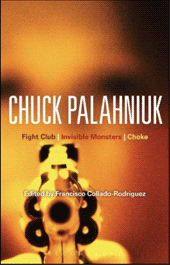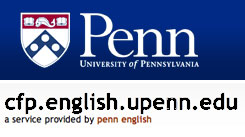Welcome to SAAS
Ana Manzanas & Jesús Benito, Cities, Borders and Spaces in Intercultural American Literature and Film

Call for Papers website provided by the Department of English at the University of Pennsylvania
Free access to courses taught by distinguished teachers and scholars at Yale University.
Chuck Palahniuk: Fight Club, Invisible Monsters, Choke (2013). Ed. by Francisco Collado.

Call For Papers for Our Next Conference
"'Fear Narratives' and their Role/Use in the United States"
PANEL 19
19) "Eco-Fear vs. Eco-Love: Fostering Environmental Citizenship in American"
Panel Chair: Diana Villanueva Romero, Universidad de Extremadura
E-mail: dvillanv@unex.es
In his article, "The World after Coronavirus," published in the Financial Times on March 20, 2020 as a response to the COVID-19 outbreak, philosopher and historian Yuval Noah Harari warned his readers of the two choices we were being compelled to make at a time when the world was suffering from its worst global pandemic in decades. He divided these choices in two: first, the decision between totalitarian surveillance and citizen empowerment and second, the choice between nationalist isolation and global solidarity.
This panel is an attempt to focus on these choices from an ecocritical perspective by reflecting on their relationship with the concepts of environmental citizenship and ecophobia in the context of American literature.
As Simon C. Estok explained in his seminal article "Theorizing in a Space of Ambivalent Openness: Ecocriticism and Ecophobia" (2009), ecophobia "is an irrational and groundless hatred of the natural world, as present and subtle in our daily lives and literature as homophobia and racism and sexism" (208). It can be fostered by "[writing] nature as a hostile opponent" (Estok 210), and by the same token, it can be deflated by representations of nature as nurturing mother or goddess. In the present time of fear of contagion, nature seems more than ever the former, that is why this panel focuses on the possibilities literature offers to develop environmental empathy instead of ecophobia. For if not, fear of nature may lead us into fantasies of obsessive control over nature instead of understanding that we are part of it. Hence, this panel may serve to reflect on whether the literary imagination is a convenient tool to foster an environmentally-driven global citizenship aimed at a partnership, not a fight, with nature.
GUIDELINES FOR PARTICIPANTS
Abstracts of Proposals are to be e-mailed directly to the chair of the selected panel using this form. The deadline for submitting abstracts is October 15, 2020. Panel chairs are expected to accept/reject proposals and have panels set up by November 15.
Non-members of SAAS (of all nationalities) are welcome to participate in the conference, but will be required to pay membership dues for one year as well as the conference registration fee. Members of ASA (American Studies Association), AISNA (Associazione Italiana di Studi Nor-Americani), APEAA (Portuguese Association for Anglo-American Studies) and HELAAS (Hellenic Association for American Studies) need only pay the conference registration fee.
Further guideliness for participants can be found here.









